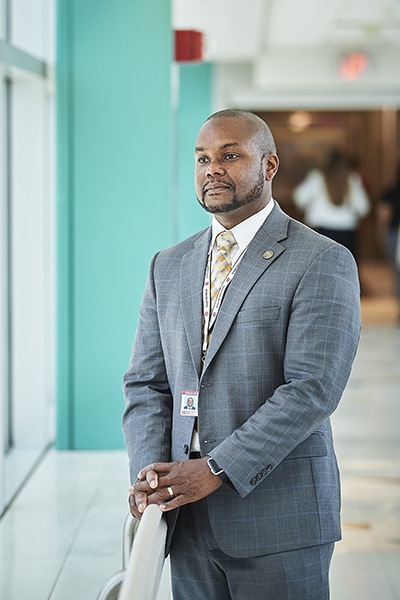Dwight McBee began his career as an ICU nurse at Paul Kimball Medical Center (now Monmouth Medical Center South) before moving to AtlantiCare, where he worked his way up to leading the office of customer experience. Now, as chief experience officer at Temple University Health System, he has extensive expertise to draw from in his professional life. However, it is a deeply personal experience that has had the greatest impact on his approach to helping manage patients’ healthcare journeys.
As a toddler, his second daughter was diagnosed with Rett Syndrome, a rare spontaneous genetic condition that primarily effects girls. A pediatric neurologist told McBee and his wife, “Don’t bother saving for college for your daughter. You’ll spend all your money navigating the healthcare system.”

“That one comment was simultaneously rude, but also hopelessly honest—and it made a huge impact on me,” McBee says. “To this day I’ve never forgotten those words. They made me realize how immensely important simple things—like the words we choose—are when we’re supposed to be helping patients.”
After this experience, McBee dedicated himself to his Christian faith and reconnected to his source of strength. He also reexamined other instances in the healthcare environment that had impacted his daughter’s experience with the healthcare system. He remembered physicians who sat on the edge of the bed and held her hand, or who shared something personal about themselves. Those simple gestures made the medical professionals more engaging and vulnerable and helped the McBee family trust them more. By creating a trusting relationship between the family and the clinical team, a partnership was formed that improved the quality of their clinical experiences.
While still at Atlanticare, McBee helped put those realizations into practice by reconnecting the organization to a motivational story about a boy trying to save thousands of starfish that are stranded on the ocean shore by throwing them back into the sea one at a time. Even though his effort seems futile, the boy persists, knowing the he’s making a difference for each individual starfish. Based on the story, McBee and his team developed The Starfish Experience curriculum, which is built on three core concepts: narrating the story, creating trusting interactions, and creating sacred moments.
“Creating sacred moments was the most important of the concepts because it empowered each individual to find their own unique way of connecting with patients,” McBee points out. “We guided them with recommendations—like sitting down when they first meet patients—but we left it up to them to find the moments that were the most meaningful on an individual basis.”
In one instance, a nurse in the post-anesthesia care unit was approached by a woman in the grocery store who recognized her from her experience after surgery for breast cancer. She had saved a water cup on which the nurse had drawn a picture—something she did for each of her patients. The cup was the woman’s reminder of her successful treatment. That moment in the grocery store made the nurse realize that was her sacred moment.
“Creating sacred moments was the most important of the concepts because it empowered each individual to find their own unique way of connecting with patients.”
During his time at AtlantiCare, McBee went on to develop an interactive training program to reinforce the training in The Starfish Experience. This included exercises to help increase staff vulnerability and sensitivities, such as blindfolding participants who aren’t told what comes next. The experience was intended to replicate the feelings patients have when they don’t fully understand their treatment or the various steps they are told to follow in a healthcare setting.
“Binary Fountain believes in Dwight’s mission that the smallest details can make the biggest differences in the patient experience,” says Ramu Potarazu, president and CEO of Binary Fountain Inc. “We have uncovered over ninety million patient insights from online reviews and patient surveys so systems like Temple can deliver a better patient experience.”
The programs all had measurable impact on AtlantiCare staff: by the time McBee left the organization, it was rated one of the top three hospitals in New Jersey for nurses communication on the national HCAHPS survey.
McBee’s leadership style is servant leadership, which focuses on effectively empowering others. He helps identify team strengths and provides the tools to leverage those attributes to create positive, productive results.

At Atlanticare, for example, he was able to mentor one of his administrative secretaries. He helped her move from a role in which she simply generated reports to a leadership position that indulged her passion for working with other people to help them improve patient experiences. That transition helped patient satisfaction scores increase in several departments.
“Success is not measured in promotions or titles,” McBee says. “It’s about helping others to perform their best so that the entire team thrives.”
At Temple, McBee developed similar programs to highlight the patient experience and raise awareness among the much larger staff. He and his team implemented the CICARE initiative—which stands for connect, introduce, communicate, ask and anticipate, respond, and end with excellence—to help guide patient interactions. Following lessons learned from his Atlanticare experience, CICARE is a simple set of guidelines for each interaction between staff members, patients, and organizational leaders that has begun to transform Temple’s culture. The development of the initiative was guided by the mantra: simplicity breeds compliance, and the simpler the expectations, and the easier they are to follow, the more likely staff members are to change their practice habits.
“We’re changing the culture by raising awareness—finding the smallest things that can make a huge difference in someone’s day,” McBee says. “I call it magnifying the mundane. We actively look for the subtlest elements of an excellent care experience and shine a light on them.”
pCare provides patients and families access to personalized education, premium entertainment, and greater control over their environment via in-room televisions and tablets. We are proud to partner with Dwight McBee and his team to make staff lives easier and patients’ experiences better at Temple Health.
Visit www.pcareinteractive.com for more information.


